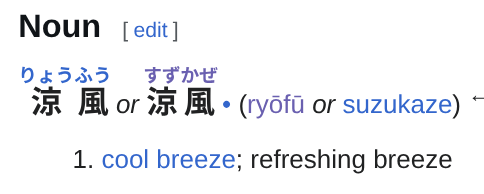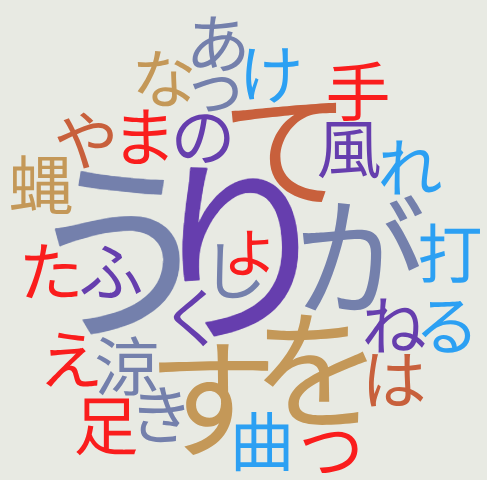I'm glad I decided to post these hiragana learning adventures because each new haiku really is an adventure! I moved on to the second Issa poem in the Boutwells' Learn Japanese through Haiku: Issa book, and it's very different from the first one because the verbs are really important here, making it harder for me to understand. I can grasp the nouns, and I even understand the noun particles to some extent... while verb formation is a total mystery to me. But hey: haiku is sometimes called "the poetry of nouns," right? So a haiku like this one with lots of verbal action is going to be the hardest kind of haiku for me to work with, and even so I still learned a lot today. Here is the poem:
涼風の 曲がりくねって きたりけり
The Boutwells' translation:
the cool breeze | twisted and crooked | then came here
And my version for children:
a cool summer breeze
it twisted and it turned and...
it came here to me!
I felt okay about adding "summer" in there because 涼風 is a kigo, meaning a cool breeze of summer. And, thinking about phonics (more on that later!), this is a nice example of the complications in English of -ed at the end of words: twisted has two syllables, and turned has just one.
I was fascinated to see that the romanization provided by the Boutwells is ryou (cool) fuu (breeze), i.e. ryōfū, but Lanoue has suzukaze (I recognize kaze for wind). So, I am officially curious about that! I found a Wiktionary entry for 涼風 as a fixed phrase, and it gives both pronunciations! I suppose I will eventually understand these things ha ha.

For my focus today, it is definitely りょうふう (ryoufuu = ryōfū) and also the beautiful cutting word at the end: けり (keri; more about kireji in haiku). Here is the Wiktionary entry for けり: the reference to "exclamatory tone" is what prompted me to use an exclamation mark in my children's version.

Like I said, I really do not understand how to parse the 3 verbal expressions in this haiku (I'm just relying on translations for the meaning), but I can happily take away a kigo and a kireji from today's adventure!
When I wrote out the kanji in hiragana that made a total of 14 different hiragana, some old, some new. Watching these hiragana and kanji accumulate, I looked for a word cloud generator that can handle these characters, and WordClouds.com seemed to work the best (other word cloud software couldn't cope with the Japanese signs). So, I made a word cloud for my 2 poems so far, but I limited it to "horizontal only" because I wouldn't be able to recognize the characters flipped around like in a usual word cloud. Still, it looks pretty cool! And it will be fun to make a new word cloud each time I add a new haiku with more hiragana and kanji.
